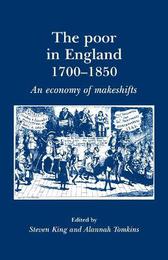
|
The Poor in England 1700-1850: An Economy of Makeshifts
Paperback / softback
Main Details
| Title |
The Poor in England 1700-1850: An Economy of Makeshifts
|
| Authors and Contributors |
Edited by Alannah Tomkins
|
|
Edited by Steve King
|
| Physical Properties |
| Format:Paperback / softback | | Pages:296 | | Dimensions(mm): Height 216,Width 138 |
|
| Category/Genre | British and Irish History |
|---|
| ISBN/Barcode |
9780719080432
|
| Classifications | Dewey:305.569094209033 |
|---|
| Audience | | Tertiary Education (US: College) | | Professional & Vocational | |
|---|
|
Publishing Details |
| Publisher |
Manchester University Press
|
| Imprint |
Manchester University Press
|
| Publication Date |
1 April 2010 |
| Publication Country |
United Kingdom
|
Description
This fascinating study investigates the experience of English poverty between 1700 and 1900 and the ways in which the poor made ends meet. The phrase 'economy of makeshifts' has often been used to summarise the patchy, desperate and sometimes failing strategies of the poor for material survival. In The poor of England some of the leading, young historians of welfare examine how advantages gained from access to common land, mobilisation of kinship support, resorting to crime, and other marginal resources could prop up struggling households. The essays attempt to explain how and when the poor secured access to these makeshifts and suggest how the balance of these strategies might change over time or be modified by gender, life-cycle and geography. This book represents the single most significant attempt in print to supply the English 'economy of makeshifts' with a solid, empirical basis and to advance the concept of makeshifts from a vague but convenient label to a more precise yet inclusive definition. -- .
Author Biography
Steven King is Professor of History at Oxford Brookes University; Alannah Tomkins is Senior Lecturer in History at the University of Keele
Reviews'Each chapter is fluently written and deeply immersed in primary sources. The work as a whole makes an original contribution to the historiography of poverty, combining as it does a high degree of scholarship with intellectual innovation.' Anne Borsay, University of Wales, Swansea
|